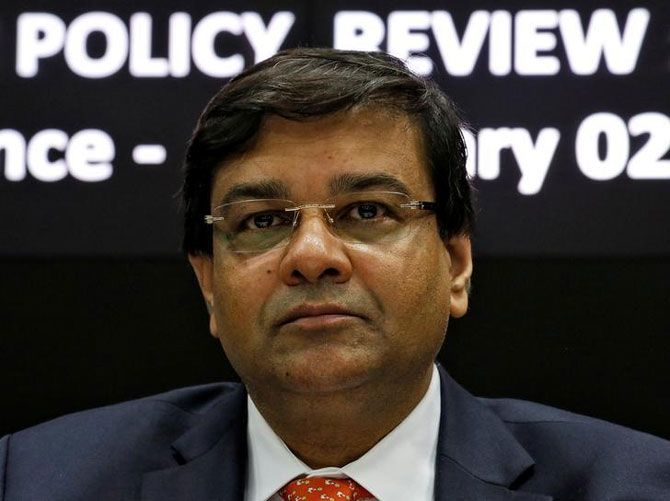Unhappy PAC asks Urjit Patel to give written answers on note ban.
Amit Agnihotri reports.

Unsatisfied with Reserve Bank of India Governor Urjit Patel's responses to specific queries on demonetisation, Parliament's Public Accounts Committee asked him to furnish written replies to the concerns expressed by members within two weeks and appear before the panel again.
Dr Patel, along with RBI Deputy Governor R Gandhi and other senior functionaries, appeared before the PAC for oral evidence on 'Review of Monetary Policy.'
The governor did not give specific answers on who initiated the note ban, how much cash had come back into the banks and when the cash supply situation would normalise, sources said.
During the four hour-long meeting, Opposition members asked Dr Patel questions on the dent in the economy, job losses and the loss of over 100 lives allegedly caused by demonetisation.
"He (Dr Patel) said there may be problems, but we will overcome them," said a member on the panel.
The RBI governor said the central bank was in touch with the service providers of some online payment platforms to reduce transaction cost.
When a member pointed out that the deposits in cooperative banks shot up around six times within days of the note ban, Dr Patel said the RBI was looking into the matter.
To have further clarity on the impact of the note ban, the PAC has also asked Finance Secretary Ashok Lavasa, Economic Affairs Secretary Shaktikanta Das, Revenue Secretary Hasmukh Adhia and Financial Services Secretary Anjuly Chib Duggal to appear before it on February 20.
Also, more than 72 days after demonetisation, the RBI, in a written answer to queries raised earlier, said it still did not know the exact number of junked currency notes that were in circulation and it is still reconciling the number of notes that were deposited back.
'The exact number of specified bank notes withdrawn from circulation is being worked out,' the central bank said.
Earlier this week, Dr Patel had told the Parliamentary Standing Committee on Finance that new currency notes to the tune of Rs 9.2 lakh crore had been introduced into the system after the removal of the old notes.
When a member wanted facilities for NRIs to deposit their old notes at embassies, citing a pact with Nepal, Dr Patel said he would look into it.
The PAC was informed by the RBI that the matter related to demonetisation was under discussion between the government and the RBI for 'some months', following which the proposal was placed before the RBI's central board on November 8 for consideration.
The board recommended the proposal to the government.
The board meeting was attended by Governor Patel, Deputy Governors Gandhi and S S Mundra, and five directors -- Nachiket Mor, Bharat N Doshi, Sudhir Mankad, Shaktikanta Das and Anjuly Chib Duggal.
Sources said Director N S Vishwanathan did not attend the meeting as he stayed back in Mumbai for "strategic reasons" to brief the bankers first hand immediately after the decision on demonetisation was taken.
Another director, Natarajan Chandrasekaran, was abroad at the time of the meeting.
Defending the cash withdrawal limits imposed after the note ban on November 8, the RBI governor said, "The ceiling on withdrawal was determined on the basis of availability, past utilisation pattern and considering the needs of the common people so that hardships are minimum."
The government has increased the cash withdrawal limit from ATMs to Rs 10,000 per day but has not changed the cap of Rs 24,000 from banks per week.
In between, it has changed the limits a number of times, as well as relaxations given on payments through scrapped currency notes.
In his written reply, Dr Patel pointed out that, in the past, people were withdrawing Rs 12,000 or Rs 13,000 per week, and Rs 50,000 per month, on an average.
"He (Dr Patel) said the benefits of the note ban will come in the medium and long terms," said another PAC member.
As Opposition members lobbed queries at Dr Patel, Bharatiya Janata Party members praised him for demonetisation and maintaining secrecy in the matter.
This provoked an Opposition member to jokingly remark that the House should pass a vote of thanks to the RBI chief.
As soon as the meeting began, PAC Chairman K V Thomas, a Congress MP, made a statement on demonetisation, prompting protests from BJP members, including Bhupender Yadav, Kirit Somaiya and Nishikant Dubey.
Citing the amendment in the RBI Act in 2016, they said any question put to Dr Patel must be in context of the central bank's monetary policy and not outside it.
After a long debate, the panel agreed that questions on demonetisation could be asked, but only in the context of monetary policy.
It is learnt that Dr Patel said the cash flow position had largely improved in the country.
To questions on the impact of demonetisation on growth, Dr Patel said there might be impact in the short run, but in the mid and long terms the move was beneficial for the economy.












 © 2025
© 2025